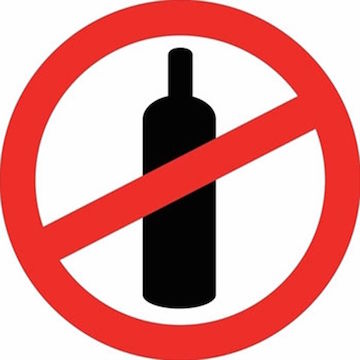No…You May Not Have Access to Burgundy, Bordeaux, German or Italian Wines
 You can sign for a bottle of Sonoma Coast Pinot Noir, but not for a bottle of Argentine Malbec.
You can sign for a bottle of Sonoma Coast Pinot Noir, but not for a bottle of Argentine Malbec.
You can receive multiple shipments of Napa Valley Cabernet Sauvignon at your door, but you can’t sign for a shipment of Austrian Riesling.
You can get excited about that receiving a shipment of Oregon Chardonnay, but no shipments of Champagne will arrive to brighten your smile.
This is the world of wine shipping imagined and promoted by HB 210, a proposed Delaware law introduced by Representative Michael Smith last week.
This wine shipping absurdity stems from the fact that HB 210 would allow shipments from out-of-state wineries, but not from out-of-state wine retailers—the only entities in the U.S that sell imported wines, not to mention the vast majority of rare, collectible and hard to find wines.
It should be noted that by banning the shipment of wines from out-of-state retailers, the people of Delaware would not have access to 2/3 of the wines actually available somewhere in the American marketplace.
Yes, this is product discrimination. Yes, this is anti-free trade. Yes, this is a function of wholesalers, local Delaware retailers, and proponents of winery shipping actively working against consumer interests.
But this is also a function of 15 years of misinterpreting the groundbreaking Granholm v Heald Supreme Court decision by courts, wholesalers, the California Wine Institute, Free the Grapes and other interests that purposefully misinterpreted the non-discrimination principles in that Supreme Court decision in order to advance their own interests at the expense of consumers.
Perhaps among the most mysterious aspects to bills like HB 210 and others that have been introduced in other states that deny out-of-state retailers the right to ship wine and, in the process, ban the shipment of imported wines, is that the country’s importer trade associations have not said one negative word about this situation. They appear to either agree with the “descriminationists” that bans on retailer shipping are constitutional or they have been so co-opted by the proponents of discrimination that they can’t bring themselves to advance their own interests. In the end, the reason for the silence of the importers doesn’t matter. What matters is that the proponents of discrimination advance an anti-consumer agenda that leads to far fewer imported wines being promoted and sold than would be the case were either importers allowed to ship direct or more states allowed retailers to ship interstate.
The question of retailer vs. winery interstate shipping is often raised in legislative and trade settings. It’s important to point out the difference between retailer online sales and winery online sales:
[ 0 ]
That symbol above represents “nothing”. There is in fact no difference between an online transaction between a winery and a retailer. The transactions are in fact identical. Consumers visit a website, they choose wines, they attest to their age, they pay with a credit card and they arranged for shipping. It’s that simple.
Still, it is important to draw attention to the objections that are often levied against wine retailer shipping by its opponents, be they wholesalers or local retailers. they can be summed up thusly:
1-It is impossible to regulate 400,000 retailers
2- In-state retailers labor on an unfair playing field when out-of-state retailers may ship in
3-Retailer shipping isn’t necessary since consumers can already get the wines they want
4-Local retailers will be put out of business and jobs will be lost locally as out-of-state and retailers take away business from in-state retailers
5-Retailer shipping will compromises the Three-Tier System
Without addressing any of these objections, it’s enough to note that each and every one of them is a pretense for simply protecting in-state wholesalers and retailers from competition.
The Delaware bill that bans shipments of wines from out-of-state retailers, but allows it from out-of-state wineries will eventually get a hearing. At that hearing, it will be suggested that the bill be amended to allow Delawareans to obtain wine shipments from out-of-state retailers. Such an amendment is a fairly simple one given the way the bill is currently written.
It will be interesting to see how that suggestion is handled by out-of-state wineries, Free the Grapes, Importers and consumers, all of whom ought to have self-interest or principles at stake in how they respond.

Doesn’t this support MADE IN AMERICA?
Bruce,
it supports Sold In America. It is the small, independent wine retailer that sells the majority of imported wines and hard to find bottles in the U.S. Supporting wine retailer shipping supports mom and pop retailers and supports consumers, not to mention a free and fair market.
Bruce,
It doesn’t matter if it’s Made in America. This latest surge of “I only want American-made products” doesn’t need to be legislated. If consumers only want to purchase American-made products, they’re free to do so. But a free market says I should be able to buy products from anywhere.
What’s more disturbing is that legislators feel the need to “protect” businesses from consumers’ choices. Did they do that when all of the bookstores went out of business thanks to Amazon? What about the stationery stores who all went out of business when Staples and Office Depot moved in? What about the hardware stores squeezed out by Home Depot and Lowes? Why are we choosing wine as the industry we need to protect?
Only because of distributors and wholesalers who have too much influence in protecting their own business. Who’s protecting the rest of us from them?
Thanks for your posts, Tom!